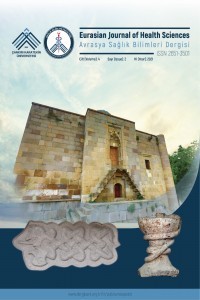Demir Eksikliği Anemisinin Nadir Bir Nedeni: Eozinofilik Gastroenterit
atopi, eozinofil, eozinofilik gastroenterit, infltrasyon, non atopi
A Rare Cause of Iron Deficiency Anemia: Eosinophilic Gastroenteriti
Atopy, Eosinophil, Eosinophilic Gastroenteritis, Infiltration, Non-atop,
___
- Erdem L, Yıldırım S, Yılmaz B, Sakız D, Gültekin OS, Peker Ö.(2000). Nedeni açıklanamayan kronik diyare nedeni ilekolonoskopi yapılan ve normal bulunan hastalarda biyopsialmanın değeri nedir? Turk J Gastroenterology, 11; 79.
- Higgins GA, Lamm ER, Yutz CV. (1966). Eosinophilicgastroenteritis. Arch Surg, 92; 476-483.
- Khan S. (2008). Eosinophilic gastroenteritis. GastroenterolClin North Am, 37; 333-348.
- Klein NC, Hargrove SL, Slisenger MH. (1970). Eosinophilicgastroenteritis. Medicine, 49; 299-319.
- Rothenberg ME. (2004). Eosinophilic gastrointestinal disorders(EGID). J Allergy Clin Immunol, 113; 11-28.
- Shweiki E, West JC, Klena JW, Kelley SE, Colley AT, Bross RJ,Tyler WB (1999). Eosinophilic gastroenteritis presenting asan obstructing cecal mass- a case report and review of theliterature Am J Gastroenterol, 94; 3644 -3645.
- Straumann A, Simon HU. (2004). The physiologicaland pathophysiological roles of eosinophils in thegastrointestinal tract. Allergy, 59; 15–25.
- Talley NJ. (2002). Eosinophilic Gastroenteritis. InGastrointestinal and Liver disease, 1972-1982.
- Talley NJ, Shorter RG, Phillips SF, Zinsmeister AR. (1990).Eosinophilic gastroenteritis: a clinicopathological studyof patients with disease of the mucosa, muscle layer andsubserosal tissues, Gut, 31; 54-58.
- Whitaker IS, Gulati A, McDaid JO, Bugajska-Carr U, ArendsMJ, (2004). Eosinophilic gastroenteritis presenting asobstructive jaundice. Eur J Gastroenterol Hepatol, 16; 407-409.
- Yayın Aralığı: Yılda 3 Sayı
- Başlangıç: 2018
- Yayıncı: Çankırı Karatekin Üniversitesi
Hemşirelik Öğrencilerinin Maneviyat ve Manevi Bakım İle İlgili Algıları
İsmail ÇETİNTAŞ, Fatma Zehra DİRİK, Elif İLHAN, Melahat AKGÜN KOSTAK
Hastanelerdeki Bireylerin Görsel Estetik Ögelere İlişkin Görüşleri
Nesrin ÇOBANOĞLU, Güzin Yasemin TUNÇAY
Eozinofilik Varyant Berrak Hücreli Renal Hücreli Karsinom: Bir Olgu Sunumu
Özgül KARAYURT, Figen EROL URSAVAŞ, Saadet ÇÖMEZ, Özlem BİLİK, Zümre ARICAN ALICIKUŞ, Nebahat ERTUĞRUL
Kronik Hastalıkların Yönetiminde Öz Yönetim Stratejilerinin Önemi ve Hemşirenin Rolü
Müjgan ONARICI, Mevlüde KARADAĞ
Demir Eksikliği Anemisinin Nadir Bir Nedeni: Eozinofilik Gastroenterit
Dirofilariosisli Köpeklerde Bir Biyomarker Olarak Paraoksonaz Aktivitesinin Belirlenmesi
Osman KINA, Tünay KONTAŞ AŞKAR, Murat GÜZEL
Ezgi SEYHAN AK, Ahmet KARAMAN, Nevin KANAN
